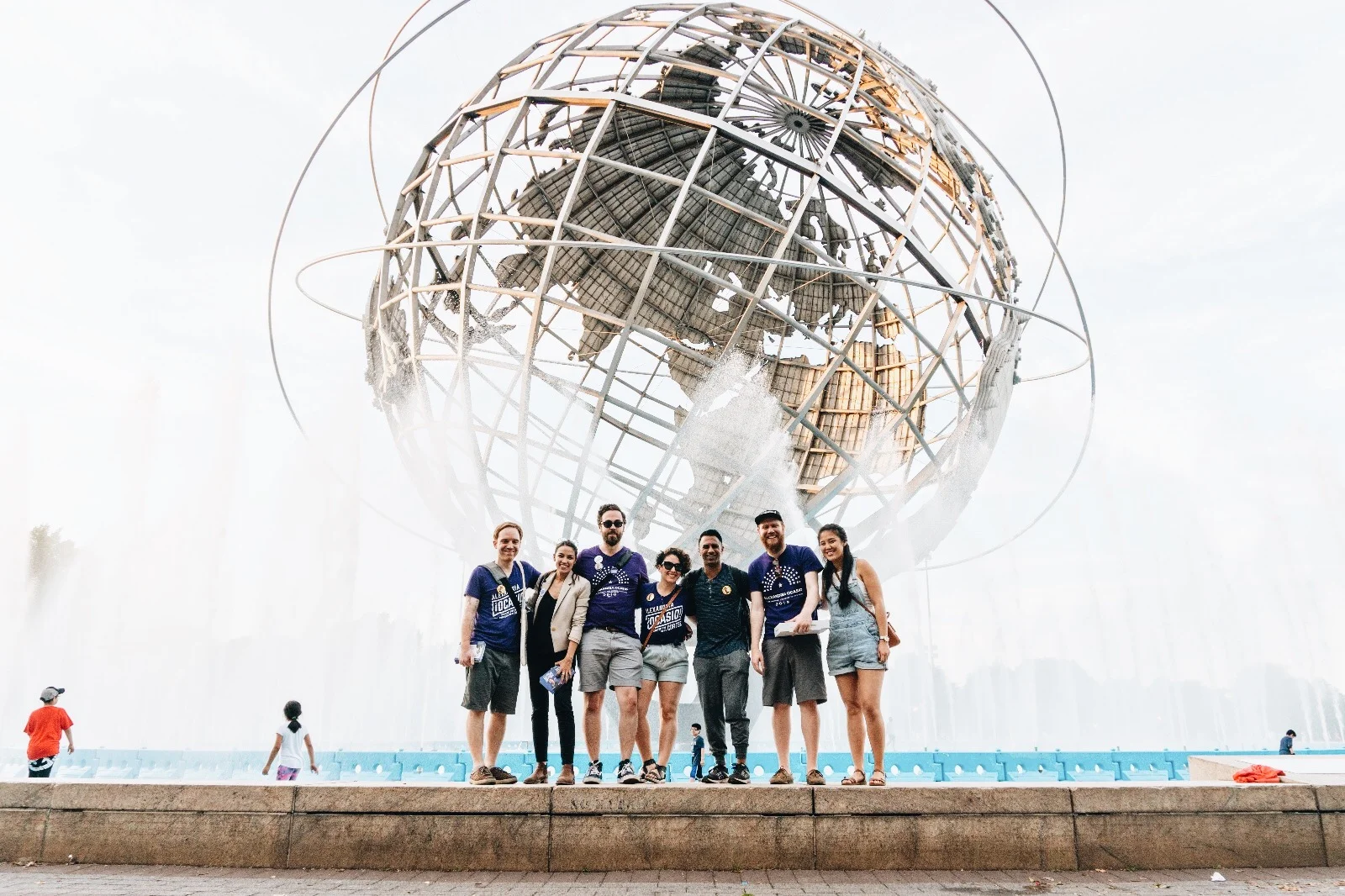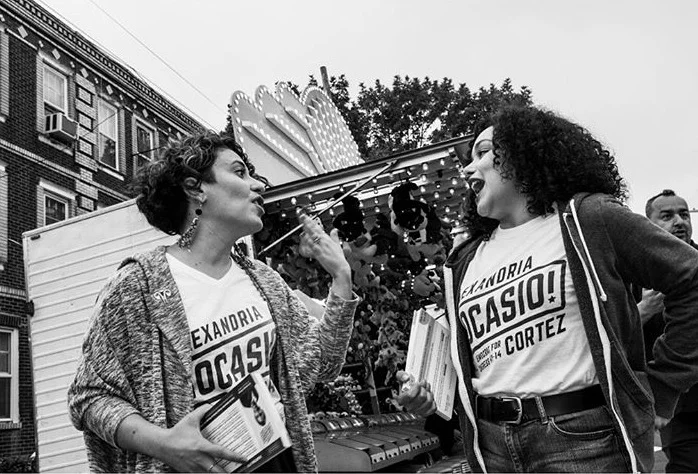How a Married Couple Helped Take On the "Queens Machine" and American Politics
Photo by Corey Torpie
On June 26, 2018, Alexandria Ocasio-Cortez won the Democratic primary in New York's 14th congressional district. She defeated 10-term incumbent, Joe Crowley.
Daniel Bonthius and Alisha Giampola, husband and wife, volunteered for Ocasio-Cortez’s primary campaign. When they began volunteering, neither Daniel nor Alisha had any professional political experiences. Alisha still teaches music at a private school on the Upper West Side and—at the time of the primary election—Daniel was working as the private events coordinator for a cabaret space in midtown, Manhattan.
Now, just a month away from midterms, we spoke about how and why they got involved—and what they hope others can learn from Ocasio-Cortez’s surprising win.
Daniel: After the 2016 election, I started an Indivisible group in my neighborhood in Sunnyside, Queens. After a few months of working to educate ourselves on the important issues affecting the country, one of our members discovered that Alexandria was running for office. We were fully supportive of having a primary, regardless of our feelings about our current representative. We reached out to her on Twitter to see if she would meet with us. Alexandria came to one of our Indivisible meetings and told us why she was running. We were all very impressed and excited to support her campaign as volunteers. Leading up to the petitioning period is when I got very involved and learned about how you get a candidate on the ballot in New York State. I organized over 100 volunteers in Sunnyside. We collected over 2,000 signatures—I collected about 750 myself.
Alisha: I have to give Daniel a lot of credit here for getting us both involved. I’d always voted, but I’d realized that just voting wasn’t enough. Our political system requires active involvement by the people. Who was it that said, “A republic, if you can keep it”? I was impressed with Alexandria at that first meeting, and particularly struck by her desire to listen, and her humility.
Photo by Andy Hur
Daniel: NY-14 as a district has some of the lowest voter turnout in the country, so finding registered voters who don’t turn out wasn’t hard. The tools that the Democratic party uses to reach out to people haven’t been modernized in decades. We came up with our own tool, an app developed by campaign volunteers, which made it so we could canvass on the street, at train stations, in living rooms, or at community events. This meant we were talking to people who’d never before been contacted by a political campaign. In-person connections are the best. Studies show that when you look someone in the eyes, you can be more empathetic. We encouraged our canvassers to tell their own stories—why they were voting for Alexandria, why they had decided to get involved in politics.
Alisha: During the petitioning process to get Alex on the ballot, the thing that made my blood boil was the number of men—usually middle-aged—who would laugh and say “I mean, sure I’ll sign your petition, but you know she isn’t going to win.” They were so sure of the establishment. But the establishment doesn’t expect non-voters to turn out in primary elections. We talked to people who had never voted before, we talked to kids who were just old enough to vote, and we talked to people who had lost faith in the system. One day, a week before the election, I was canvassing near a park and a little old lady and her granddaughter walked by. I handed them a card and said,“Don’t forget to vote next Tuesday!” The old lady said, “Oh I don’t vote anymore, dear. It’s too depressing.” And her granddaughter said, “Really? I’m going. You should come with me.” And the old lady changed her mind right there. I was blown away.
Daniel: It’s important to note that voters of color and poor voters are directly disenfranchised by voting laws at an extraordinary rate—and New York State is one of the worst. I’d encourage you to look up the report “Mississippi on the Hudson” by The Black Institute which goes into more detail. Obstacles include simple things like the fact that election day is also a work day. Many countries, and even some states, are making election day a holiday or moving it to the weekend. Additionally, most people think of election day as a once a year occurrence. So reminding people that they have to vote, not just in November, but in April and June and September, is critical. For whatever reason, New York State has chosen to split up their primaries so you vote for federal offices in June, and statewide offices in September. People don’t often know there are multiple elections, and are often unable to take time off work to vote.
Alisha: I also think people stay away from the polls because of a deep apathy—which is tied to disenfranchisement, of course. If you don’t believe your vote matters, or will be counted, you are less likely to show up on election day. Volunteering for Alexandria, we would talk to people who were completely convinced that even if they went out to vote, somehow Crowley and the “Queens machine” would ensure their vote wasn’t counted. We were hypervigilant of voter suppression tactics and encouraged people who saw things on election day, like people being turned away before the polls closed, to report it. I was in the middle of helping someone figure out if they had been incorrectly turned away when we realized that Alexandria was actually winning and if we wanted to go to the victory party in time for them to call it, we needed to go!
Daniel: It does. Every vote matters. I think we’ve seen examples of how close races can be in the past few years, not the least important of which is Donald Trump’s election in 2016, where he won the election with a total of about 75,000 votes across 3 states.
Alisha: I definitely identify with this feeling. I am really pessimistic by nature, and I also have had the privilege of being able to be politically apathetic in the past. I completely get it. Particularly if you think your vote is a tiny blue dot in a giant pool of other blue dots anyway, or if you think you’re just a tiny blue dot in a huge sea of red dots, why bother. But I think I would say, “Voting is the bare minimum. Voting is everyone’s most basic participation in democracy. As discouraging as it can be, It will make you feel empowered to take the next step.”
Photo by Jennifer Mason
Daniel: I’m still surprised, to this day, how easy it is for anyone to step in and massively impact a political campaign. It truly just takes one person putting the time in. It’s not as daunting a prospect as it seems, particularly for someone who already has a lot of privilege.
Alisha: I think the most unexpected thing was that Alex won. For the majority of the lead-up to the primary, there was almost no money and virtually no paid staff members. But we had really passionate members of the community determined to give themselves a choice at the ballot box. I remember one night, Daniel and I were in the kitchen making a late dinner after a long day of working our regular jobs and volunteering, and I said: “Wouldn’t it be completely insane if she actually won?” I think for a long time it was just enough that she was campaigning, leading this movement, inspiring us to all be more involved and more active.
Daniel: Do it all! Don’t wait for direction. Just do it. Run for office, knock on doors, volunteer, phone bank. You can’t wait for someone to ask you to do something. You just have to do it. Find someone you support, go to their office, join their campaign. They’re waiting for you. If you’re reading what I’m saying right now, that means you have time to donate to a campaign.
Alisha: Take one small step. It is so ridiculously easy to feel absolutely hopeless. But if you give yourself a little goal, like “I’m going to call my representatives every day this week at noon,” that’s really do-able. Right after the election, I got the 5calls.org app on my phone and I just called my representatives in between my morning and afternoon classes at the school where I teach. I’d put it on speaker phone while I was putting stuff away or answering emails. It usually took less than ten minutes. And it was so incredibly satisfying.
All photos care of Alisha Giampola.
















